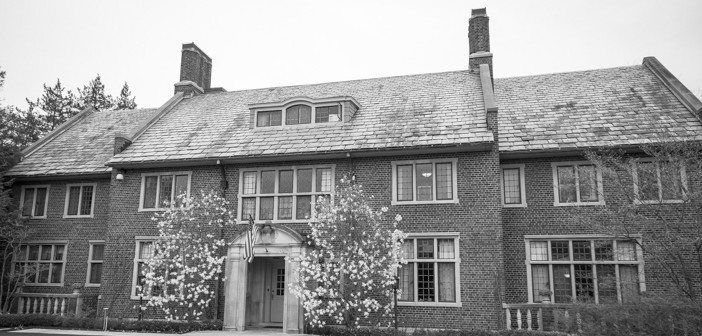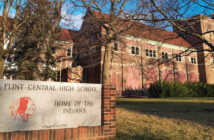Part II of this feature includes the early history of Applewood Estate, Flint Institute of Music, Flint Youth Theater (Bower Theater) and Buick Gallery.
Applewood Estate
Applewood was built in 1916 as a gentleman’s farm for the Charles Stewart Mott family and is listed on the National Registry of Historic Places. The home and grounds encompass approximately 34 acres that include an orchard with 29 varieties of heritage apples and 18 extensively landscaped acres. The original gatehouse, barn and chicken coop complete the 65-acre estate.
The estate was named after the apple orchard on the front lawn. While Mott made his money as a major contributor in General Motors, the Mott name is still used on a popular applesauce. Mr. Mott’s family in New York sold the business and name years ago. Mr. Mott commissioned his brother-in-law, architect Herbert Davis, to work cooperatively with the landscape architect, William Pitkin, Jr., to design a practical family home. The original buildings are all brick with slate roofs and copper gutters.
The pleasure and draft horses, cows, pigeons, chickens, ducks, pheasants and pigs were tended by the farmer whose family lived in the gatehouse. A large vegetable garden and bush and tree fruits provided a bounty for the table and were always given priority over purchased foods. A cut flower garden with rose-laden trellises produced vases of fresh flowers for the house, starting a tradition that continues today.
The estate’s unused pastureland was given to Flint’s citizens as the site of Mott Community College and upon Mr. Mott’s death in 1973, his widow, Ruth Mott was left to consider the future of the estate, a shadow of its former beauty. Ruth Mott passed away on January 25th, 1999. Applewood is now a part of the Ruth Mott Foundation, which is her legacy to the community.
Flint Institute of Music (Dort Music Center)
The Flint Institute of Music, also called the FIM, is currently ranked as the eighth largest community music school in the United States. The FIM is comprised of The Flint Symphony Orchestra, Flint School of Performing Arts and Flint Youth Theatre.
In 1917, the Community Music Association was begun by J. Dallas Dort. In the 1920s, the chorus and symphony were funded by United Way. In 1958, the Flint College & Cultural Development Committee of Sponsors acquired the J. Dallas Dort Home for Flint Community College (a division of the Flint Board of Education) to serve the community’s music needs. In the early 60s, the idea for a music center began where prep school students could receive quality training and work toward a degree, all in one building.
In 1966, Articles of Incorporation were adopted for the FIM, whose first objective was a building campaign to house a new school of music with a community service division. Groundbreaking for the Dort Music Center took place in 1969 and in 1970, the old Dort Home burned in a fire.
In 1971, the Dort Music Center was dedicated, and the Musical Performing Arts Association (MPAA) and Community Music Association dissolved along with several other musical organizations that merged to the newly formed Flint Institute of Music.
The Dort Music Center construction was completed and Genesee Community College classes moved there. The Dort Music Center was designed to be constructed around and complement the Old Dort Home (which burned before construction was completed) to house what was then Mott Community College music classes and community music programs (professional and amateur.)
The 40,000 square-foot space was designed so that if and when expansion was desired, a second story could be added. The architects were Ellis, Arndt and Truesdell.
Flint Youth Theater (Bower Theatre)
The Flint Youth Theatre was originally the Bower Theatre. In 1956, the theatre was named for F.A. Dutch Bower, Chief Engineer for Buick. He was also considered by many to be a community leader. Bower started a knife company and was a founding member of the Flint Institute of Arts.
Groundbreaking for the Bower Theatre took place in 1957, and it was opened and dedicated in 1958. Bower was designed by Mackenzie, Knuth & Klein architects of Flint for educational and cultural use. Artist, William McVey, was commissioned to create a sculpture for the theatre. The ceramic piece tells the story of the planning, construction and use of the theatre, and is bolted on the north wall of the building.
A major use of the theatre was the Flint Community Players, who produced five plays per year. In 1965, a Sponsor’s Theatre Series (later called Flint Professional Company) began offering four professional summer theatre productions a year for a few years.
Today, the theatre is known for its award-winning professional theatrical productions and offers year-round classes for area youth through its Drama School. In its home at The William S. and Claire M. White Center, which includes Elgood Theatre and Bower Theatre, FYT productions not only entertain, but also provide audiences of all ages with uncompromising explorations of compelling social issues.
Buick Gallery and Research Center
In 1998, Buick Motor Division announced it was moving its world headquarters from Flint to Detroit. On November 10, two days before the official move, Robert Coletta, Buick’s General Manager, helped open the Sloan Museum’s Buick Gallery & Research Center. The relationship between Flint and Buick had long been close and important, he had said. “This facility is a stake in the ground that will always be a forceful statement that Flint and Buick will always be together.” The leadership at Buick Motor Division always knew that by coming to Sloan Museum, they were working with an organization that shared with them a passion for Buick. They’ve worked closely since 1966, the day that Sloan museum opened its doors.
Today, the Buick Gallery houses the largest and finest collection of Buick-related materials available to the public.
Sources: flintculturalcenter.org, 1979 Cultural Center Project, Cultural Center Feasibility Study








